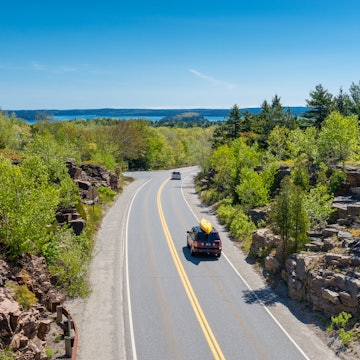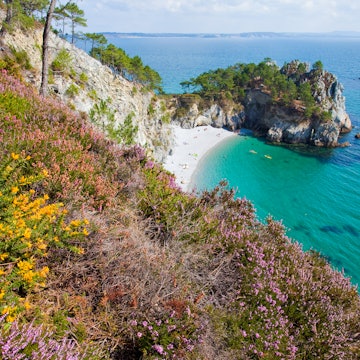

Low tide allows to reach the Brough of Birsay, which preserves the remains of ancient civilizations that from the 7th to the 13th centuries AD inhabited the Orkney islands, Scotland
No boat? No problem. Here are eight islands you can reach on foot. Just lace up your shoes, wait for the tide to roll out and voilà: pathways appear that lead to fairy-tale castles, religious shrines, Viking houses and other exhilarating sights.

Brough of Birsay, Orkney, Scotland
A whole lot of history has gone down on the desolate Brough of Birsay. In the 7th and 8th centuries the tribal Picts staked a claim, and remnants of their settlement remain. Next came the Norse, who left behind amazing Viking hall-houses from the 10th century or so. The ruins of St Peter's Church survive from the 12th-century, when the Brough was the seat of Orkney's rulers. Clown-like puffins and sweeping, lighthouse-dotted cliffs add to the otherworldly vibe. A visit to this ocean outcrop is unreal, especially as you wait for the hazy concrete path to emerge from the tide and lead you across the water.

Noirmoutier, Brittany, France
For a few hours at low tide each day, the 4.5km Passage du Gois surfaces from the sea and connects the village of Beauvoir-sur-Mer, on the mainland near Brittany, to the storybook island of Noirmoutier. It's a dreamy place of whitewashed, blue-shuttered houses, colourful hollyhocks and glinting salt pans. There's even a medieval castle with a Michelin-starred restaurant hiding behind it. You can make the trip on wheels, but it's much more fun to go on foot and join locals searching for cockles and clams in the exposed sand. Pay attention to tide times, or be ready to climb one of the safety poles placed at intervals along the passage to wait it out until the waters recede.

Jindo and Modo, South Korea
For a few days each year (usually in spring), the tide drops exceptionally low, exposing a 2.8km-long, 40m-wide causeway that connects the island of Jindo to the nearby island of Modo in the nation's southwest corner. Known as the Ganjuyuk Gyedo (Mysterious Sea Road), it has long been celebrated among Koreans in legend. The Jindo Miracle Sea Road Festival is held annually to coincide with the road's advent, attended by 300,000 people who make the crossing in knee-high rubber boots.
Minister's Island, New Brunswick, Canada
It always seems like magic: at low tide you amble 1km across the ocean floor to reach Minister's Island, and then at high tide the path vanishes under several feet of water. The Reverend Samuel Andrews bought the island in 1790 as a base to tend to his parishioners, hence the name; the little stone cottage where he lived still stands. Railway magnate William Cornelius Van Horne purchased the island next in 1890. He wasn't messing around when he built his ‘cottage’ – a 50-room whopper with 17 bedrooms, 11 fireplaces and a windmill to bring running water into the home. A walkabout time-warps you into faded, Edwardian-era opulence.

Haji Ali Dargah, Mumbai, India
Here's the legend of the Dargah, a Sufi shrine on an islet beside Mumbai: Muslim saint Pir Haji Ali Shah Bukhari – performer of miracles, teacher of Islam here in the mid-15th-century – died while on a pilgrimage to Mecca. His shroud inexplicably floated back to this fleck of rock, so his followers built a white marble mosque on the spot to hold his tomb. For much of the day it shimmers out at sea like a mirage. But when the tide goes down, a causeway rises up that allows devotees to walk to the holy site – which they do in droves, especially on Fridays when Sufi devotional singers send melodies to the heavens.
Bar Island, Maine, USA
This part-time island floats just offshore from the village of Bar Harbor. Head downtown to the foot of Bridge St at low tide, and behold as a natural gravel land bridge morphs from water. It's a 1.5km walk over to the islet, where you can poke around the forest, meadows and rocky shoreline. A trail leads up to a small peak that offers lovely views of the surrounding sea and mountains. The postcard scenery is no surprise, as the island is part of Acadia National Park, one of America's wildest coastal landscapes.

Lindisfarne, Northumberland, England
A stone's throw from the Scottish border, the Holy Island of Lindisfarne remains as remote and windswept as when St Aidan stepped ashore to build his monastery here in 635. Twice a day the tides shift, and a path appears that leads through the sand and mudflats. Known as the Pilgrim's Way, the route has been used for centuries to trek over to the wee isle. A line of vertical poles marks the 5km way, and the reward for those who make the journey includes ancient abbey ruins to explore, a brooding hilltop castle to climb to, and a bird reserve to visit where merlins and bar-tailed godwits roam.
Mandø, Denmark
Tranquil Mandø hovers in the Wadden Sea near the west coast town of Ribe. Visit the isolated little island and it'll just be you, the rustling grass, the grazing sheep and some 60 villagers under the slate-blue sky. To get to Mandø you can, in theory, stroll over on the causeway that pops up at low tide, though no one does this because the mud makes it a real slog. Instead everyone climbs aboard the tractor-pulled bus whose mighty tyres ply the muck, squishing to and fro until the water returns and sets the island afloat once more.
https://shop.lonelyplanet.com/products/epic-hikes-of-the-world-1














